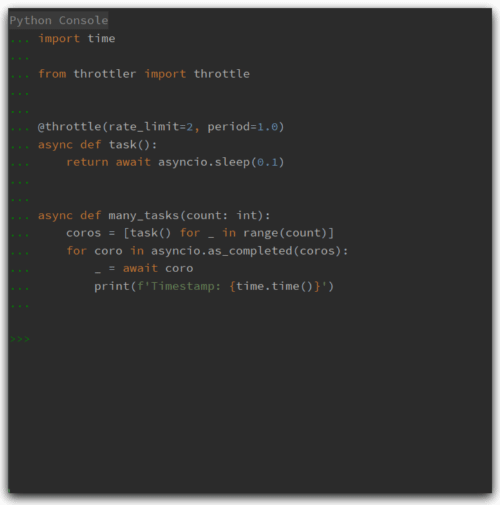Throttler alternatives and similar packages
Based on the "Miscellaneous" category.
Alternatively, view Throttler alternatives based on common mentions on social networks and blogs.
-
boltons
🔩 Like builtins, but boltons. 250+ constructs, recipes, and snippets which extend (and rely on nothing but) the Python standard library. Nothing like Michael Bolton. -
transitions
A lightweight, object-oriented finite state machine implementation in Python with many extensions -
PythonMonkey
A Mozilla SpiderMonkey JavaScript engine embedded into the Python VM, using the Python engine to provide the JS host environment. -
Blinker Herald
The Blinker Herald includes helpers to easily emit signals using the excellent blinker library. -
Roundup Issue Tracker
Mirror of http://hg.code.sf.net/p/roundup/code -- used for CI. Please visit https://issues.roundup-tracker.org to find starter issues or log new issues. -
import_string
Imports an object based on a string import_string('package.module:function_name')() - Based on werkzeug.utils
WorkOS - The modern identity platform for B2B SaaS

* Code Quality Rankings and insights are calculated and provided by Lumnify.
They vary from L1 to L5 with "L5" being the highest.
Do you think we are missing an alternative of Throttler or a related project?
README
Throttler
Zero-dependency Python package for easy throttling with asyncio support.
📝 Table of Contents
- 🎒 [Install](#-install)
- 🛠 [Usage Examples](#-usage-examples)
- 👨🏻💻 [Author](#-author)
- 💬 [Contributing](#-contributing)
- 📝 [License](#-license)
🎒 Install
Just
pip install throttler
🛠 Usage Examples
All run-ready examples are [here](examples).
Throttler and ThrottlerSimultaneous
Throttler:
Context manager for limiting rate of accessing to context block.
from throttler import Throttler
# Limit to three calls per second
t = Throttler(rate_limit=3, period=1.0)
async with t:
pass
Or
import asyncio
from throttler import throttle
# Limit to three calls per second
@throttle(rate_limit=3, period=1.0)
async def task():
return await asyncio.sleep(0.1)
ThrottlerSimultaneous:
Context manager for limiting simultaneous count of accessing to context block.
from throttler import ThrottlerSimultaneous
# Limit to five simultaneous calls
t = ThrottlerSimultaneous(count=5)
async with t:
pass
Or
import asyncio
from throttler import throttle_simultaneous
# Limit to five simultaneous calls
@throttle_simultaneous(count=5)
async def task():
return await asyncio.sleep(0.1)
Simple Example
import asyncio
import time
from throttler import throttle
# Limit to two calls per second
@throttle(rate_limit=2, period=1.0)
async def task():
return await asyncio.sleep(0.1)
async def many_tasks(count: int):
coros = [task() for _ in range(count)]
for coro in asyncio.as_completed(coros):
_ = await coro
print(f'Timestamp: {time.time()}')
asyncio.run(many_tasks(10))
Result output:
Timestamp: 1585183394.8141203
Timestamp: 1585183394.8141203
Timestamp: 1585183395.830335
Timestamp: 1585183395.830335
Timestamp: 1585183396.8460555
Timestamp: 1585183396.8460555
...
API Example
import asyncio
import time
import aiohttp
from throttler import Throttler, ThrottlerSimultaneous
class SomeAPI:
api_url = 'https://example.com'
def __init__(self, throttler):
self.throttler = throttler
async def request(self, session: aiohttp.ClientSession):
async with self.throttler:
async with session.get(self.api_url) as resp:
return resp
async def many_requests(self, count: int):
async with aiohttp.ClientSession() as session:
coros = [self.request(session) for _ in range(count)]
for coro in asyncio.as_completed(coros):
response = await coro
print(f'{int(time.time())} | Result: {response.status}')
async def run():
# Throttler can be of any type
t = ThrottlerSimultaneous(count=5) # Five simultaneous requests
t = Throttler(rate_limit=10, period=3.0) # Ten requests in three seconds
api = SomeAPI(t)
await api.many_requests(100)
asyncio.run(run())
Result output:
1585182908 | Result: 200
1585182908 | Result: 200
1585182908 | Result: 200
1585182909 | Result: 200
1585182909 | Result: 200
1585182909 | Result: 200
1585182910 | Result: 200
1585182910 | Result: 200
1585182910 | Result: 200
...
ExecutionTimer
Context manager for time limiting of accessing to context block. Simply sleep
periodsecs before next accessing, not analog ofThrottler. Also it can align to start of minutes.
import time
from throttler import ExecutionTimer
et = ExecutionTimer(60, align_sleep=True)
while True:
with et:
print(time.asctime(), '|', time.time())
Or
import time
from throttler import execution_timer
@execution_timer(60, align_sleep=True)
def f():
print(time.asctime(), '|', time.time())
while True:
f()
Result output:
Thu Mar 26 00:56:17 2020 | 1585173377.1203406
Thu Mar 26 00:57:00 2020 | 1585173420.0006166
Thu Mar 26 00:58:00 2020 | 1585173480.002517
Thu Mar 26 00:59:00 2020 | 1585173540.001494
Timer
Context manager for pretty printing start, end, elapsed and average times.
import random
import time
from throttler import Timer
timer = Timer('My Timer', verbose=True)
for _ in range(3):
with timer:
time.sleep(random.random())
Or
import random
import time
from throttler import timer
@timer('My Timer', verbose=True)
def f():
time.sleep(random.random())
for _ in range(3):
f()
Result output:
#1 | My Timer | begin: 2020-03-26 01:46:07.648661
#1 | My Timer | end: 2020-03-26 01:46:08.382135, elapsed: 0.73 sec, average: 0.73 sec
#2 | My Timer | begin: 2020-03-26 01:46:08.382135
#2 | My Timer | end: 2020-03-26 01:46:08.599919, elapsed: 0.22 sec, average: 0.48 sec
#3 | My Timer | begin: 2020-03-26 01:46:08.599919
#3 | My Timer | end: 2020-03-26 01:46:09.083370, elapsed: 0.48 sec, average: 0.48 sec
👨🏻💻 Author
Ramzan Bekbulatov:
💬 Contributing
Contributions, issues and feature requests are welcome!
📝 License
This project is MIT licensed.
*Note that all licence references and agreements mentioned in the Throttler README section above
are relevant to that project's source code only.





